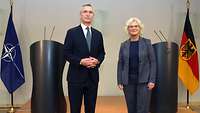
News
An interview with Christine Lambrecht: “We can achieve a great deal”
First paragraph of the articleInterview with Christine Lambrecht: “We can achieve a great deal”
In an interview with the newspaper 'Welt am Sonntag", Federal Minister of Defence Christine Lambrecht discussed the Ukraine crisis, nuclear sharing, operations in Mali and her plans for the Bundeswehr.
In light of the concentration of Russian troops at the Ukrainian border, the NATONorth Atlantic Treaty Organization Secretary General has been talking about the risk of war in Europe. How do your contacts in the military see the situation, Ms Lambrecht?
When over 100,000 Russian soldiers are marshalled right at the Ukrainian border, that is an extremely threatening situation. We are on alert, we see the danger – and we are doing everything to prevent it.
On Wednesday, the German Federal Chancellor said that, in the event of a Russian attack, “everything” is up for discussion in terms of sanctions. Do you also interpret that as a turning point in his position on the Nord Stream 2 pipeline?
Lambrecht: If the Federal Chancellor says that every political, diplomatic, and economic measure is being examined, then nothing can be off-limits.
Is there a consensus within the Social Democratic Party (SPDSozialdemokratische Partei Deutschlands) about that?
Yes. The idea that war could break out in the middle of Europe, initiated by Russia, and we would be engaging in economic cooperation at the same time, is totally absurd.
Some parts of the Free Democratic Party (FDP) are discussing the possibility of supplying arms, contrary to the agreement within the government. How seriously do you take that?
I can understand wanting to support Ukraine. But that is exactly what we are already doing. For example, we are handing over an entire field hospital in February, including the necessary training – all co-financed by Germany with 5.3 million euros. We have also already supplied ventilators. And we treat severely injured Ukrainian military personnel in our Bundeswehr hospitals. So we are supporting Kyiv. Now, we need to do all we can to de-escalate. In that regard, supplying arms would not be helpful at this time – the German government is in agreement on that.
Many SPDSozialdemokratische Partei Deutschlands politicians have been referring to the Ostpolitik or “Eastern policy” with which West Germany normalized relations with Eastern Europe under Willy Brandt. What do you think today’s version would have to look like?
We are already practising an eastern policy entirely in keeping with Willy Brandt’s. On the one hand, we are relying on deterrence, but, on the other, we have finally reopened lines of communication that had been closed for years. Our position is that we should now once again use all levels of negotiation – from the OSCEOrganisation for Security and Co-operation in Europe to the Normandy Format. It was also an important signal that the NATONorth Atlantic Treaty Organization-Russia Council met again after more than two-and-a-half years. But anyone who thought that these initial discussions would immediately lead to a breakthrough was naïve. The important thing now is to continue the discussions.
Brandt’s Eastern policy included assuming that Russia’s security interests would also be taken into account. In terms of today, what security interests would you grant Russia?
They certainly do not include the right to make decisions about other countries. Nor do they include the right to call Eastern European countries’ membership in NATONorth Atlantic Treaty Organization into question. Russia does not have veto power over accessions to NATONorth Atlantic Treaty Organization. Every sovereign country that shares our values is free to apply for membership. However, aside from these red lines, the Western side is very willing to talk to Russia and take its interests into account.
What do you think of Ukraine being neutral, without membership in any alliances?
We don’t have the right to decide what foreign policy or alliance status Ukraine should have. Only Ukraine has that right.
Putin is also trying to expand his spheres of influence in other parts of the world, for example in Mali. How are you handling the deployment of Russian mercenaries there?
I welcome the fact that it will have consequences. Moscow will not succeed in using the deployment of mercenaries to basically get the West to automatically withdraw from anywhere Russia doesn’t want us to be. We will not give way. We are not going to make it that easy for Russia.
Do you have the impression that the Malian military junta is still interested in Germany’s assistance?
If they want to have the Bundeswehr in the country, then they also have to make sure that the conditions are right. Our military personnel have to be able to move about freely and be protected as much as possible. Apropos, that also includes protection with drones. I will make it very clear to the Malian government that it is not acceptable to postpone elections for five years or cooperate with mercenaries who are guilty of severe violations of human rights.
When can you provide the military personnel in Mali with armed drones?
The systems will become available during this legislative period. But that is not all. I currently have staff in the Federal Ministry of Defence developing guidelines for the use of armed drones in accordance with ethics and international law. Ultimately, it will always be up to the parliament to decide whether this weapon is mandated for an operation.
Moscow has stationed a great deal of its most advanced nuclear-capable missiles in the European part of Russia. Is the deterrence policy of the West, and therefore also Germany, still working?
Our goal is still a world without nuclear weapons. That means that we advocate nuclear disarmament, while also adhering to and participating in nuclear deterrence until nuclear weapons cease to be a threat to world peace. That is why we took a clear stance in favour of nuclear sharing in our coalition agreement.
Is the deterrence concept of having planes transport nuclear bombs to the target in the event of a crisis still up-to-date?
When it comes to key issues of nuclear deterrence, it is important to us that we have a real say in NATONorth Atlantic Treaty Organization. Accordingly, we are in favour of nuclear sharing as long as it is part of the strategy. That’s the one thing. The other is that the German government will attend the first Meeting of States Parties to the Treaty on the Prohibition of Nuclear Weapons as an observer. As I said: Our goal is still a world without nuclear weapons. The two aspects are complementary.
In order to maintain NATONorth Atlantic Treaty Organization’s deterrence, the old Bundeswehr Tornados would have to be replaced. Now you have to decide whether to replace them solely with European jets – or with a mix of Eurofighters and American F-18 or F-35 aircraft. Which solution are you leaning towards?
Right now, I want to have all the options on the table. We have to decide on all of this very soon because the Tornados have to be replaced by no later than 2030. Some people are hoping that we will manage to have a European solution. But that solution would have to be within the time frame. That makes it difficult. Whatever happens, an appropriate decision with a very advanced solution will be made.
So buying modern F-35 aircraft is also one of the options?
I said all the options are on the table.
No matter which model is chosen in the end, it will be expensive. In the German Bundestag, you called for a larger military budget. What amounts are you banking on for 2022 and in medium-term financial planning?
I’m not banking on any specific amount. The important thing for me is being able to meet the requirements for the tasks assigned to the Bundeswehr in the best way possible. It is not acceptable for me to have the responsibility, as part of NATONorth Atlantic Treaty Organization, to ensure operational and materiel readiness – and with it the security of the citizens in our country – but not to have appropriate funding for that purpose. We are facing huge challenges, ranging from replacing the Tornados, to a new heavy transport helicopter and much more. I was very pleased to hear the Federal Chancellor say that the necessary funding for these things would be provided to the extent possible.
“To the greatest extent possible...” Federal Minister of Finance Christian Lindner wants to return to the balanced budget amendment known as the “debt brake” in 2023. He says that federal ministers who want to fund new things need to consider “what is no longer necessary”.
I wouldn’t put ensuring the Bundeswehr’s operational and materiel readiness in that category. That isn’t anything new, but rather an ongoing responsibility. Naturally, it is also our job here in the Federal Ministry of Defence to become more efficient and prioritise tasks. However, that doesn’t mean that I will make cutbacks in the armed forces’ capabilities. Ensuring security is a key responsibility of the state.
The public report on the materiel situation states that just over 77 percent of the major weapon systems are mission-ready. Has someone already told you about the actual situation that is kept secret? In other words, are the generals frank with you?
Yes, and that has been very important to me from the beginning. I don’t need any generals who give me sugar-coated reports. I want straight talk so I can make decisions on an accurate basis. My impression is that I’m given frank advice.
Marie-Agnes Strack-Zimmermann, an FDP politician and Chairwoman of the Defence Committee of the German Bundestag, criticised the “empty words” of the generals in the Federal Ministry of Defence. Are military personnel under Minister Lambrecht allowed to be open in advising members of parliament – or do you expect their loyalty to come first?
I certainly do expect loyalty, but I don’t see that as contradictory to open communication. That parliamentarians get all the information they need in order to make their decisions – that is guaranteed under Minister Christine Lambrecht.
Will you keep your current Chief of Defence?
Working with Eberhard Zorn has been a very positive experience so far. I think that he advises he appropriately. With that in mind, I see no reason to make a change.
Eberhard Zorn wants to reform the Bundeswehr’s dysfunctional leadership structure. Is he allowed to do that?
I will take a very close look at the key elements that the Chief of Defence prepared with my predecessor. But I will take the time to do so.
What do you have planned?
I don’t want to rush headlong into a major structural reform. We will start with a few things that can go fast and take effect quickly. I can imagine assigning decentralised Bundeswehr units more responsibility with larger budgets for taking care of basic purchases on their own. My hope is that this would reduce the workload for the personnel who handle major projects. I want to look at public procurement law, including the unused leeway in the European public tendering guidelines. And, before you ask: I know we have been hearing from every Federal Minister of Defence for the past 22 years that something has to change. Nevertheless, I believe that we can achieve a great deal with pragmatism – both in the interest of our military personnel and for the security of our country.


Share content on